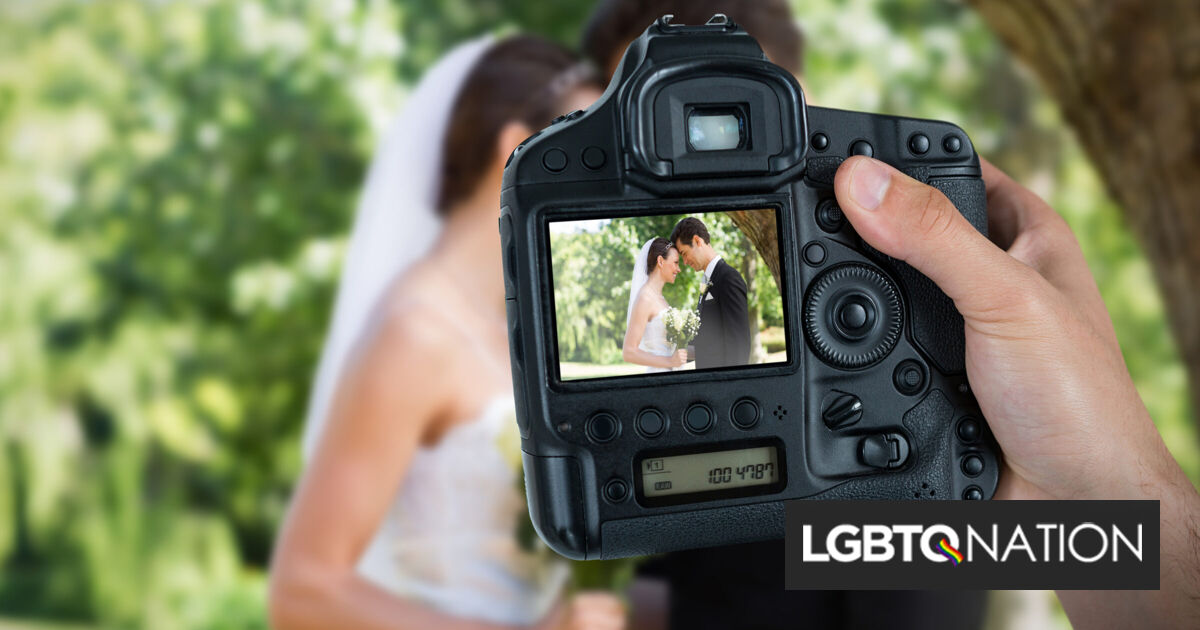His win is a direct result of the Supreme Court’s decision in a pivotal LGBTQ+ rights case.
No one should be forced to participate in something they disagree with. Whenever I’m trying to figure out if denial of service is reasonable, I imagine it with nazis. For example wedding cakes. If a gay couple goes to a bakery for a wedding cake, they should absolutely be able to purchase a standard wedding cake, and it’s none of the baker’s business what they use it for. But the baker should not be forced to decorate in a specifically gay way (like a topper with a pair of men). If a gross couple wants to have a nazi wedding, they should absolutely be able to purchase a standard wedding cake, and it’s none of the baker’s business what they use it for. But the baker should not be forced to pipe a swastika on it.
If it’s reasonable for a photographer to feel uncomfortable working a nazi wedding, it’s reasonable for one to feel uncomfortable working a gay wedding.
Obviously there’s an enormous difference between being gay and being a nazi. I’m not equating those things. I’m equating the feeling of repulsion and discomfort of the one providing the service.
I’m pretty sure you choose to be a hateful spiteful Nazi. You don’t choose to be gay. There’s a HUGE difference. It is a bad faith argument to equate holding hateful views and opinions to being born different. With that reasoning, the feeling of discomfort when an owner sees a black person or an Asian person is acceptable grounds to deny services to them.
I can´t believe I actually have to say this but here it comes: Everyone should be free to choose the things they do and don´t do. Nobody should be forced by law to do things they don´t want to do. This goes for LGBTQ+ people just as it goes for photographers and all other humans in this world. I support human rights 100%, which obviously especially includes discriminated minorities like LGBTQ+. However, I have to say that the framing in the article and it´s title, are edgy af and sound like based on an extremist, culture warrior ideology, instead of rational thinking and common sense.
Nobody should be forced by law to do things they don´t want to do.
That’s not going to work. There are many kinds of people, and some of the things they want to do or refuse to do are disruptive or dangerous.
That guy doesn’t want to take care of his home projects, and now toxic smoke is blowing into his neighbors houses. Are you going to just say “well he doesn’t want to deal with that, so the law can’t make him”? I hope not because that creates a shitty world for everyone.
So maybe you meant something different and more limited than what you wrote?
So maybe you meant something different and more limited than what you wrote?
No, just more limited than your interpretation. I never meant to imply that “Nobody should be forced by law to do things they don´t want to do.” should cancel out all of people’s personal responsibilities. Nobody who offers a service is responsible to offer that service to everyone imo. Imagine a gay person working in any field, could be forced by law, to provide their service to neo-nazis and you might see how pointless your approach is in practice.
Glad we agree that we don’t want an unbounded freedom from responsibility.
But I mean if you don’t force people to serve the entire public you risk some presumably unwanted consequences. Should a whole grocery chain be able to say no blacks? What if it’s the only one in the town? Should realtors be allowed to refuse to sell houses to non whites? What if that means all the black people get forced into one part of town, and coincidentally that part has shitty services and other unwanted traits?
Is the rule “as long as there’s alternatives it’s ok”? Separate but equal was already decided to be unequal.
On the other hand, I do want to be able to refuse service to Nazis. Maybe the key is naziism is wholly something you choose. But I also don’t want people to be able to refuse service to, like, union members.
There’s no universal “anti social behavior” metric, unfortunately, I don’t think.
But I mean if you don’t force people to serve the entire public you risk some presumably unwanted consequences. Should a whole grocery chain be able to say no blacks? What if it’s the only one in the town? Should realtors be allowed to refuse to sell houses to non whites? What if that means all the black people get forced into one part of town, and coincidentally that part has shitty services and other unwanted traits?
Those are examples of public, structural discrimination, which imo is the kind of discrimination that is manageable with laws pretty well. However there is also the kind of individual, private discrimination that can not really be solved by the law. I think it absolutely should be illegal for a company to openly discriminate a group, let’s say by putting up a “No XY” sign and officially not serving XY. However, I also see the limits of how much such laws can do in practice. For example despite such a law being in place, a company could easily still not serve XY -just inofficially- and simply claim a full schedule whenever XY people show up/call, without the law being able to do anything about it. That is why I think laws are not enough and in the end a real social change is necessary to end these types of unjust discrimination.
Is the rule “as long as there’s alternatives it’s ok”? Separate but equal was already decided to be unequal.
Discrimination based on inherent traits is unjust af and therefore can never be “okay”.
On the other hand, I do want to be able to refuse service to Nazis.
I feel the same
Maybe the key is naziism is wholly something you choose. But I also don’t want people to be able to refuse service to, like, union members.
It’s not a simple topic, right? On one hand, I would want it to be legal to put up a “we don serve Nazis” sign, on the other hand, one could argue that someone who was born into a Nazi family and was constantly spoon fed the ideology from the beginning, never really had a chance to not become a Nazi.
There’s no universal “anti social behavior” metric, unfortunately, I don’t think.
In the end I think only education that leads to the understanding that people who are different from you are not your enemies, can help the problem.
Why are headlines about American Christians always the exact opposite of what the Bible wants them to be?
What happened to love thy neighbour and shit
deleted by creator
Generally speaking it’s almost always a bad idea to force somebody who’s diametrically opposed to your core values to work for you. I don’t understand how they would have wanted this to ideally go? That the photographer grinds their teeth while being forced to take photos of them?
Show me someone saying “This is fine”, and I’ll show you someone who has the privilege to not fear whether they’re going to be blocked out of society for the crime of…existing. This is only the first step to “All businesses, including businesses required for life, can discriminate against LGBTQ+ individuals”. Y’all are unhinged.
Obligatory:

I think it’s a bit silly to apply Popper to an issue about taking wedding photographs. Popper himself published the idea in 1945, in a time where intolerances were a bit more on the serious side.
deleted by creator
I disagree with him, and I think he’s bigoted. But I don’t think anyone has the right to his labor and that he should be legally forced to photograph things that he doesn’t want to photograph. And it’s not like photography is a business that anyone can corner the market of in a small town or anything like that, all you need is a camera. It’s the most common side hustle I see people try.
And how do you differentiate between this and say, a shop, or a doctor? Do LGBT people not “have the right to the labour” of those services?
I disagree with that framing entirely. But I’m curious to know how you would differentiate.
I think the difference comes down to creative outlets. Just like with the “create a website for same-sex weddings”. I also feel a photographer should be able to deny a Trump themed wedding or cake. But if it’s a general service or product offered to everyone, you shouldn’t be able to deny a person just for being gay or black or anything protected. I don’t know if I’m elaborating my thoughts about it well but do you get where I’m coming from?
A wedding photographer offers their services to everyone having weddings. If that photographer refuses to photograph same-sex weddings, is that not the same as denying service to someone over their sexuality?
You make a good point and I thought the same thing after I made my initial comments. Another one I thought about was what if a person truly strongly believed in segregation, even maybe it being a part of their religion. Does that mean it’s ok for them to deny black people? That makes me deeply uncomfortable to put it lightly; I don’t think that is justifiable.
At the same time, there is something very personal about creative pursuits. Graphic artists can reject any idea and they don’t have to justify it. And this is something that is custom made for each customer. If the artist isn’t interested, and even is morally opposed to performing the work, even if they were legally required to do it, is it going to be their best work? Can they be penalized for deliberately doing a terrible job? I don’t know








